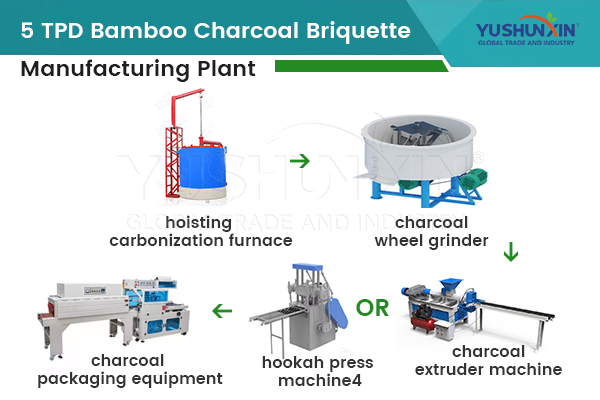Bamboo charcoal is a versatile product, renowned for its high absorption capacity and environmental benefits. As the demand for sustainable and eco-friendly products grows, so does the interest in bamboo charcoal. The production process involves the use of specialized machinery designed to convert bamboo into high-quality charcoal efficiently. In this guide, we explore the types of machines used in this process and their roles in transforming raw bamboo into valuable bamboo charcoal.

Bamboo Harvesting and Preparation
Harvesting Equipment
The journey of bamboo charcoal begins with the harvesting of mature bamboo, typically using specialized cutting tools and machinery. Modern bamboo harvesters are equipped with advanced features that ensure precise and efficient cutting, minimizing waste and preserving bamboo quality.
Pre-processing Machinery
Once harvested, the bamboo is transported to processing facilities where it undergoes pre-processing. Machines like bamboo splitters and crushers are used to break down the bamboo into smaller, uniform pieces suitable for carbonization. This step is crucial for ensuring consistent quality in the final charcoal product.
Carbonization Process
Carbonization Kilns
The heart of bamboo charcoal production lies in the carbonization process. Traditional methods involve earthen kilns, but modern production has shifted towards more efficient and controlled carbonization using industrial kilns. These kilns are designed to maintain optimal temperatures and conditions to convert bamboo into charcoal with minimal emissions.
Continuous Carbonization Furnaces
For larger-scale production, continuous carbonization furnaces are employed. These advanced machines allow for ongoing processing of bamboo, enhancing efficiency and output. The continuous design ensures an uninterrupted supply of heat and controlled atmosphere, critical for producing high-quality bamboo charcoal.
Pyrolysis and Activation
Pyrolysis Machines
Pyrolysis is a crucial step that involves heating bamboo in the absence of oxygen to break down its components. Advanced pyrolysis machines are engineered to precisely control temperature and pressure, optimizing the conversion process and ensuring a higher yield of charcoal.
Activation Equipment
To enhance the adsorption properties of bamboo charcoal, it undergoes an activation process. Activation equipment, such as steam or gas activation machines, is used to increase the surface area of the charcoal, making it highly porous and effective for use in air and water purification.
Post-processing and Packaging
Grinding and Pulverizing Machines
After carbonization and activation, the bamboo charcoal is often ground into various sizes depending on its intended application. Grinding and pulverizing machines allow manufacturers to produce different grades of charcoal, from fine powder for cosmetics to larger granules for filtration systems.
Packaging Machinery
The final step in bamboo charcoal production is packaging. Automated packaging machines are used to weigh, bag, and seal the charcoal, ensuring it is ready for distribution. Efficient packaging preserves the quality and extends the shelf life of the product, facilitating its transport and sale.
Environmental and Economic Impact
Sustainable Production
Bamboo is a rapidly renewable resource, and its use in charcoal production supports sustainable practices. The machinery involved in this process is designed to minimize waste and emissions, aligning with environmental goals and reducing the carbon footprint.
Economic Opportunities
Investing in bamboo charcoal production machinery opens up numerous economic opportunities. By turning bamboo, an abundant and often underutilized resource, into valuable products, manufacturers can tap into growing markets for sustainable goods and contribute to regional economic development.
Conclusion
The production of bamboo charcoal is a testament to how innovative machinery can transform a simple natural resource into a high-demand product. From harvesting to packaging, each machine plays a vital role in ensuring the process is efficient, sustainable, and economically viable, paving the way for a greener future. Visiting: https://www.ysxcharpro.com/product/bamboo-charcoal-production-line/
Leave a Reply